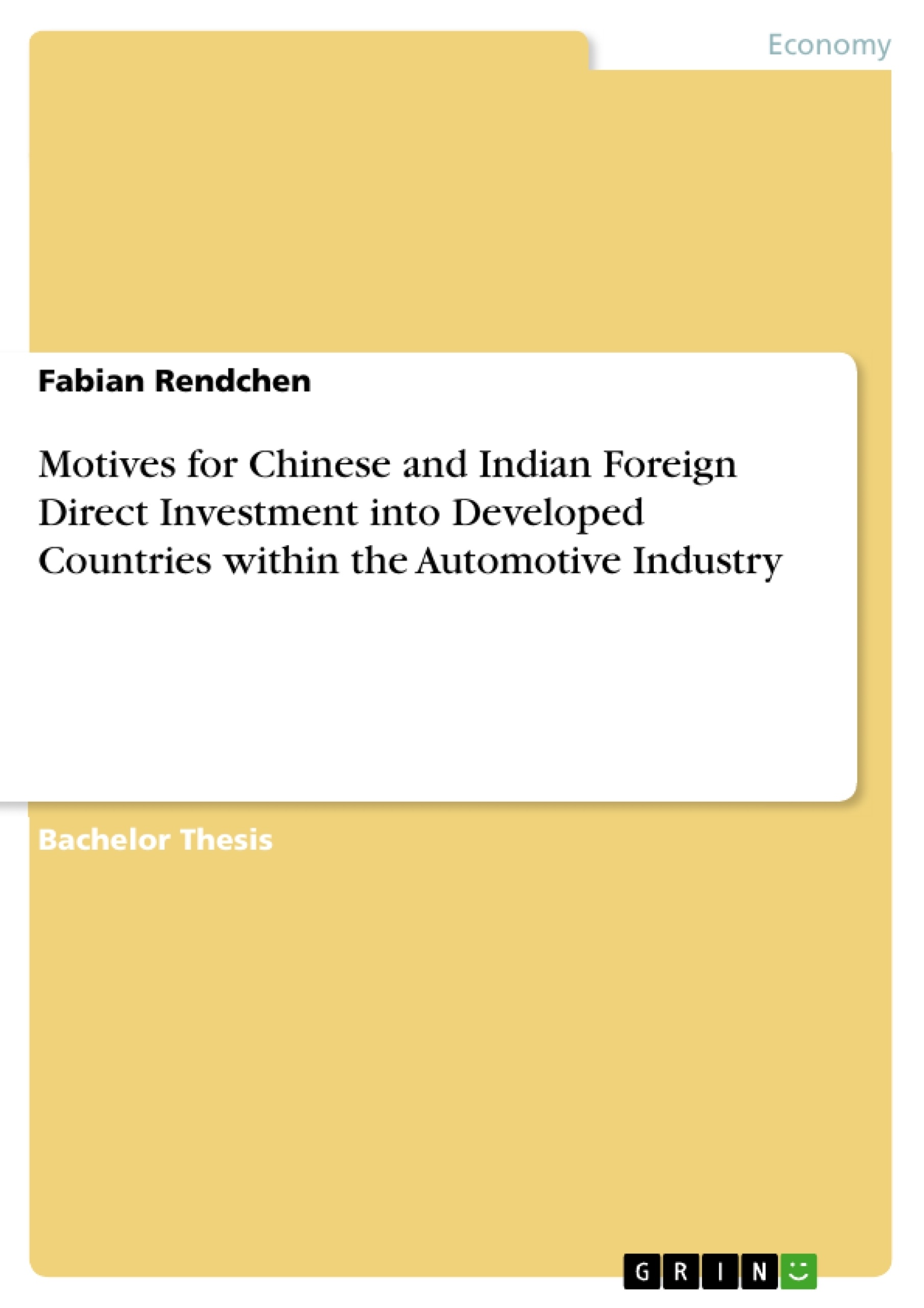Fuelled by integration, trade liberalisation and deregulation the global economy is transforming into an interdependent system. Within this development the internationalisation of companies from developed countries only marked a first stage. The second and current stage sees the rise of emerging market firms investing not only into neighbouring but also into highly developed markets (Baskaran & Chaarlas, 2012; Gaur & Kumar, 2010; Goldstein, 2007a; Karl P Sauvant, Maschek, & McAllister, 2009; Williamson, Ramamurti, Fleury, & Leme Fleury, 2013). This trend challenges established internationalisation theories claiming that emerging market firms initially only invest into economies less developed than their own. Therefore it serves as a present, important and moreover heavily discussed area of research (Mathews, 2006; C. Wang, Boateng, & Hong, 2011; C. Wang, Hong, Kafouros, & Boateng, 2012).
Inhaltsverzeichnis (Table of Contents)
- 1. Defining the Problem
- 1.1 Contemporary Significance of the Subject
- 1.2 Objectives of the Research
- 1.3 Organisation of the Research
- 1.4 Limitations of the Research
- 2. Theoretical Framework
- 2.1 Foreign Direct Investment
- 2.1.1 Demarcation and Definition
- 2.1.2 Methods and Types
- 2.2 Internationalisation
- 2.2.1 Underlying Drivers
- 2.2.2 Motives
- 3. China
- 3.1 China's Economy
- 3.2 China's Outward Foreign Direct Investment
- 3.3 China's Automotive Industry
- 3.4 Case Study China
- 3.4.1 Geely Company Overview
- 3.4.2 Motives for Geely's Acquisition of Volvo
- 3.5 Evidence for Further Motives in China
- 4. India
- 4.1 India's Economy
- 4.2 India's Outward Foreign Direct Investment
- 4.3 India's Automotive Industry
- 4.4 Case Study India
- 4.4.1 Tata Motors Company Overview
- 4.4.2 Motives for Tata Motors' Acquisition of Jaguar Land Rover
- 4.5 Evidence for Further Motives in India
- 5. Cross-Case Analysis
Zielsetzung und Themenschwerpunkte (Objectives and Key Themes)
This research explores the motives behind Chinese and Indian foreign direct investment (FDI) in the automotive industry of developed countries. It aims to analyze the driving forces and strategic considerations that shape these investments, particularly focusing on the recent acquisitions of prominent automotive companies like Volvo by Geely (China) and Jaguar Land Rover by Tata Motors (India). The research seeks to understand the factors influencing the decision-making process of these emerging market multinational companies (EMNCs) and to contribute to the ongoing discourse on the evolving role of developing countries in globalized markets.
- The growing significance of outward foreign direct investment (OFDI) from emerging economies like China and India.
- The strategic motives behind EMNCs' investments in developed countries, particularly within the automotive industry.
- The impact of global economic integration and trade liberalization on internationalization strategies of emerging market firms.
- The role of government policies and incentives in shaping FDI flows from China and India.
- The challenges and opportunities associated with EMNCs' acquisitions of established companies in developed markets.
Zusammenfassung der Kapitel (Chapter Summaries)
The research begins by defining the problem and outlining the contemporary significance of the subject. It then establishes a theoretical framework by discussing foreign direct investment and internationalization, exploring key concepts and drivers. Chapter 3 focuses on China's economy, its outward FDI, and its automotive industry. It presents a case study on Geely's acquisition of Volvo, analyzing the underlying motives for this investment. Chapter 4 follows a similar structure, examining India's economy, its outward FDI, and its automotive industry. It presents a case study on Tata Motors' acquisition of Jaguar Land Rover, exploring the motives behind this strategic move. Chapter 5 conducts a cross-case analysis, comparing the findings from the Chinese and Indian case studies. The conclusion summarizes the key findings and implications of the research.
Schlüsselwörter (Keywords)
Foreign Direct Investment (FDI), Outward Foreign Direct Investment (OFDI), Emerging Market Multinational Companies (EMNCs), Automotive Industry, Internationalization, China, India, Geely, Volvo, Tata Motors, Jaguar Land Rover, Acquisitions, Strategic Motives, Global Economic Integration, Trade Liberalization.
Frequently Asked Questions
What are the main motives for Chinese FDI in the automotive industry?
Key motives include strategic asset seeking, such as Geely's acquisition of Volvo to gain technology, brand reputation, and access to developed markets.
Why did Tata Motors acquire Jaguar Land Rover?
The acquisition was driven by the desire to expand globally, acquire premium brands, and integrate advanced automotive technologies into their portfolio.
How does EMNC investment challenge traditional theories?
Established theories claimed firms start by investing in less developed markets; however, Chinese and Indian firms are increasingly investing directly into highly developed economies.
What role does government policy play in OFDI?
Government incentives and strategic national goals in China and India significantly influence and support the outward foreign direct investment flows of their domestic firms.
What is the significance of trade liberalization for these investments?
Trade liberalization and deregulation have transformed the global economy into an interdependent system, facilitating easier internationalization for emerging market firms.
- Arbeit zitieren
- Fabian Rendchen (Autor:in), 2014, Motives for Chinese and Indian Foreign Direct Investment into Developed Countries within the Automotive Industry, München, GRIN Verlag, https://www.grin.com/document/301891



